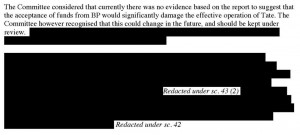 A three year battle by activists to find out more details of BP’s secretive sponsorship deal with Britain’s iconic art institution, the Tate, will finally be resolved on Thursday this week.
A three year battle by activists to find out more details of BP’s secretive sponsorship deal with Britain’s iconic art institution, the Tate, will finally be resolved on Thursday this week.
For years activists have been trying to uncover the amount and details of BP’s sponsorship deals with the Tate. They have done this by using British Freedom of Information (FOI) laws.
The activists, from the environment arts group, Platform London, working with the Request Initiative, have been trying to find out how much money the Tate had received in sponsorship from BP, as well as see copies of minutes between the Tate and BP where the renewal of the oil giant’s sponsorship agreement had been discussed and ultimately approved.
While campaigners have used existing information in the public domain to estimate that the amount Tate receives from BP only a paltry 0.4% of Tate’s overall operating budget, the exact figure remains unknown.
In return for this amount, BP gets to greenwash its image and achieve institutional buy-in to the Tate’s global brand.
The arts institution has seen numerous recent protests against BP’s sponsorship of its work, not least last week when over 100 members of the arts collective Liberate Tate unfurled a 64 metre square black cloth, a reinterpretation of Russian abstract painter Kazimir Malevich’s iconic Black Square which is currently on display as part of the Malevich exhibition at Tate Modern.
The implicit comparison was made between Malevich’s Black square and Tate’s use of black squares in redacting information.
The Tate is extremely reluctant to disclose the exact nature of its funding from BP. After receiving an FOI request, the Tate refused to give out this information. This led to an appeal by Platform and the Request Initiative to the official body in the UK that oversees such matters, the Information Commission.
In March this year, the head of that organisation, the Information Commissioner, ruled that the Tate was breaking information laws on several counts by refusing to remove redactions from sets of minutes from its Ethics Committee Meetings and the Tate Trustee meetings.
The Tate appealed that decision and now the case will be held at the final arbitration committee, called an Information Tribunal on Thursday.
Kevin Smith, an oil sponsorship campaigner from Platform argues that “The debate about BP sponsorship often boils down to the question as to whether or not Tate could realistically replace BP’s sponsorship money through alternate sponsors or other revenue streams. By refusing to disclose how much money it is getting from BP, Tate is effectively shutting down this important public discussion.”
Platform’s lawyers from the UK’s leading environmental law firm, Leigh Day, argue that Tate’s refusal to be open and transparent about its commercial relationship with BP is setting a “damaging precedent”.
Let’s see what happens on Thursday. Whilst the world’s eyes will be on a certain vote in Scotland, many anti-oil activists will be hoping their three year battle for the truth in London will finally come to fruition.
